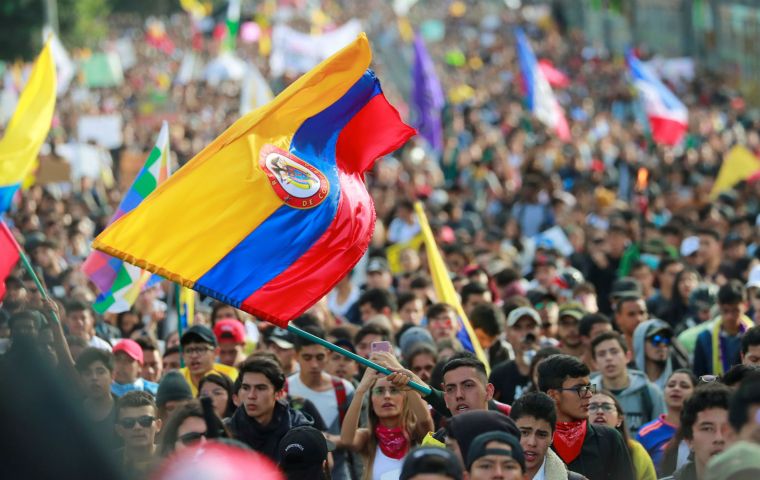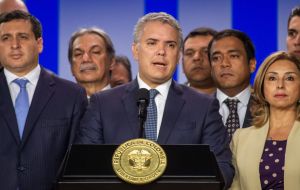MercoPress. South Atlantic News Agency
Colombian president caught between demands from businesses and people protesting in streets
 Galvanized by nearly a week of protests unions are clamoring for government to scrap the bill, which includes tax cuts for businesses
Galvanized by nearly a week of protests unions are clamoring for government to scrap the bill, which includes tax cuts for businesses  If Duque fails to pass the reform or is forced to water it down dramatically, he will frustrate business leaders and conservative allies
If Duque fails to pass the reform or is forced to water it down dramatically, he will frustrate business leaders and conservative allies Widespread street protests in Colombia are likely to force embattled President Ivan Duque to make major changes to his tax reform proposal if he wants to pass the bill before a year-end deadline.
Galvanized by nearly a week of protests and inspired by demonstrations across Latin America, unions are clamoring for the government to scrap the bill, which includes tax cuts for businesses, while opposition parties are trying to slow the legislative debate in hopes of winning concessions.
The constitutional court has ruled the bill must be passed by year-end or the tax regime will revert to 2018 provisions.
If Duque fails to pass the reform or is forced to water it down dramatically, he will frustrate business leaders and conservative allies who say the bill is essential to maintain the country’s credit rating and reduce debt.
The government originally said the tax bill would raise revenue by about 1% of GDP, boost investor confidence and stave off a potential ratings downgrade.
“Duque will have to try and find amicable solutions fast because the protesters’ leverage grows as time goes by,” analyst Sergio Guzman of Colombia Risk Analysis said.
The largely peaceful protests in Bogota and other cities have brought thousands of marchers to the streets over issues ranging from corruption to the murder of activists and the heavy-handed reaction of riot police.
Duque on Tuesday attempted to mollify critics by including provisions for disadvantaged populations in the bill. He suggested a value added tax could be returned to the poorest fifth of Colombians and less affluent retirees could contribute less to the healthcare system.
These changes “will not be enough,” Guzman said.
Scrapping the cut in business duties, backing a popular congressional pay cut and increasing the 2020 minimum wage by a hearty margin are ways Duque can “show, not tell” that he is responsive to protesters, he said.
Opposition parties in congress are already leveraging the protests to prolong the debate on Duque’s proposals in a bid to get more concessions from the president.
“The opposition has asked the finance minister to delay the vote and incorporate the proposals that people, citizens in the street, have made,” said Katherine Miranda, Green Party lawmaker and member of the lower house economic committee. “For example, for the tax base not to grow.”
“It’s not the appropriate political moment to be backing the type of reforms that generally lower taxes on businesses, because in people’s heads that’s a way of helping the rich,” said Marc Hofstetter, a professor of economics at the University of the Andes.
Duque may regret responding to protests with an invitation for a national dialogue through mid-March 2020, Hofstetter said.
“The risk is this becomes a permanent protest, like what happened in Chile, surely with consequences for the economy, employment and regular people’s income,” he said. “Putting a March deadline is a bit of an invitation to stay on the streets.”




Top Comments
Disclaimer & comment rulesCommenting for this story is now closed.
If you have a Facebook account, become a fan and comment on our Facebook Page!